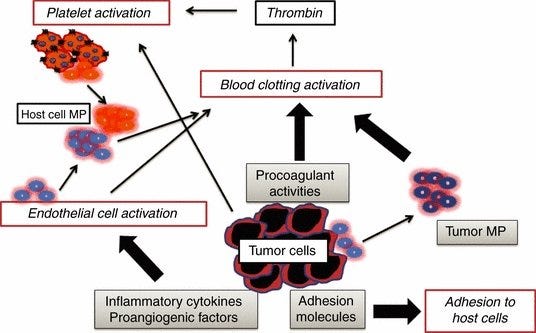Any extracts used in the following article are for non commercial research and educational purposes only and may be subject to copyright from their respective owners.
Thanks @Parsifaler
Key take:
Vascular conditions conducive to thrombosis are also conducive to tumor growth and metastasis due to mediated fibrin matrix formation and angiogenesis.
“Thrombosis can also represent the earliest clinical manifestation of an occult cancer [22]. Indeed, patients with idiopathic VTE show a four- to seven-fold increased risk of being diagnosed with cancer in the first year after thrombosis, as compared with patients with VTE secondary to known causes, and the risk of cancer is even higher in patients with recurrent thromboembolism and in those with bilateral VTE. “
https://threadreaderapp.com/thread/1480534969013440515.html
In thread:
Coagulation and cancer: biological and clinical aspects
"Interestingly, direct oncogene activation and/or tumor suppressor gene impairment, may result in the stimulation of blood clotting and/or suppression of fibrinolysis, which can produce thrombosis and/or DIC in some in vivo models."
“The pathogenesis of blood coagulation activation in cancer is complex and multifactorial. However, a unique feature in malignancy is the role played by the expression of tumor cell-associated clot promoting properties. These properties lead to the activation of the clotting cascade, with the generation of thrombin and fibrin, and the stimulation of platelets, leukocytes and endothelial cells which expose their cellular procoagulant features. Several of these mechanisms can contribute to tumor development and progression [4], particularly MP-enriched prothrombotic and proangiogenic factors are new important players in supporting tumor growth [5]. In the last decade, our knowledge grew after the discovery of a complex scenario in which oncogenic events drive the procoagulant conversion of tumor cells.”
https://onlinelibrary.wiley.com/doi/10.1111/jth.12075
The values of coagulation function in COVID-19 patients
https://www.ncbi.nlm.nih.gov/labs/pmc/articles/PMC7595402/
Covid-19-Associated Coagulopathy: Biomarkers of Thrombin Generation and Fibrinolysis Leading the Outcome
https://pubmed.ncbi.nlm.nih.gov/33126772/
Use of low-molecular-weight heparin in COVID-19 patients
https://www.ncbi.nlm.nih.gov/labs/pmc/articles/PMC7297673/
PROTHROMBIN FRAGMENT 1.2 PREDICTS THROMBOSIS IN HOSPITALIZED PATIENTS WITH COVID-19
https://advances.massgeneral.org/research-and-innovation/journal.aspx?id=1685
I can add this, there certainly appears to be a correlation:
"...most patients with breast, lung, uterine and brain cancers developed VTE as a terminal event of the disease."
1997 Nov;78(5):1316-8.
Occult cancer in patients with venous thromboembolism: which patients, which cancers
Abstract
We have previously demonstrated that patients with idiopathic venous thromboembolism (VTE) have a higher frequency of underlying cancer. Now we present a retrospective analysis of our 5-year experience with a series of 674 consecutive otherwise healthy patients, and a more restricted battery of diagnostic tests. Occult cancer was found in 15 patients during admission. The diagnostic tools which led to suspect occult cancer were: abdominal CT-scan (4 patients); high carcinoembryonic levels (2 patients); and high prostate-specific antigen levels (9 patients). Eight further patients were diagnosed of cancer after discharge. Cancer was more commonly found in patients with idiopathic VTE: 13/105 patients (12%) versus 10/569 patients (2%); p <0.01; O.R.: 7.9 (95% CI: 3.14-20.09). During the same period of time we diagnosed VTE in 147 patients with previously known cancer. When overall considered, VTE was the first sign of malignancy in most patients with prostatic and pancreatic carcinoma. On the contrary, most patients with breast, lung, uterine and brain cancers developed VTE as a terminal event of the disease. At variance with VTE patients and previously known cancer, most patients with occult malignancy were at an early stage. Further studies are needed to confirm whether patients with idiopathic VTE could benefit from screening for occult cancer. Meanwhile, our findings may serve as guidelines for physicians in this field.






